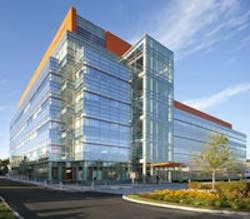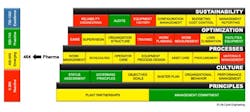Benchmarking Bolsters Improvement Efforts
Founded in 1981 in Boston, Mass., Genzyme has evolved from a tiny startup to one of the world's leading biotech companies, with nearly 10,000 employees and operations in every region of the globe. Our products address rare genetic diseases, multiple sclerosis, cardiovascular disease and endocrinology; we maintain a substantial development program focused on these fields as well as other areas of unmet medical need. Acquired by Sanofi in 2011, Genzyme now benefits from the reach and resources of one of the world's largest pharmaceutical companies, with a shared commitment to improving the lives of patients.
As a company, we were facing many issues common to manufacturers in the pharmaceutical and biotech industry, including:
• compliance challenges, and quality, health and safety, and environmental expectations;
• production downtime impacting product supply due to capacity constraints;
• expected product sales growth;
• market pressures to reduce manufacturing costs; and
• stockholder expectations to operate and maintain the manufacturing assets cost effectively.
Genzyme global engineering decided that setting up a global maintenance and reliability network was an important way to address these issues. So, the vice president of global engineering convened a conference and workshop in the fall of 2009 for site maintenance and reliability professionals worldwide. It brought together people from plants in the U.S., Ireland, the U.K. and Belgium. The event featured a keynote address by our then-CEO demonstrating visible leadership support for the goals of the conference. Our global network recognized that the reliability and maintenance functions at the sites would play an important role in achieving the organizational objectives — and that using a common approach was essential.
We realized many opportunities existed for continuous improvement in maintenance and reliability. But we didn't know which areas to concentrate on first at each site, what areas of opportunity were common among sites, and which sites had good or best practices in place. So the big questions were: "What is the current status of our sites today?," "What are the major themes and opportunities for improvement among the sites?," and "What do we work on first?"
Figure 1. Overlaying benchmark assessment results on Reliability Excellence model indicated substantial room for improvement. Source: Life Cycle Engineering
ROBERT CHRISTMAN is the associate director of global reliability engineering for Genzyme, Framingham, Mass. SCOTT MORRIS is an associate director supporting global reliability engineering for Genzyme in Framingham. E-mail them at [email protected] and [email protected].

